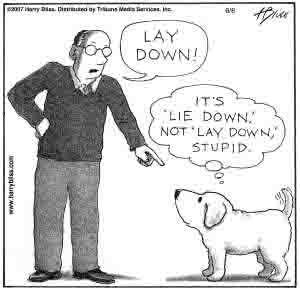
Sit and rise have I's--and lie does too.
"Coz these are things that I, all by myself, can do.
Set, raise, and lay are words that you choose
When each one has an object after it to use.
I am going to take sit/set; rise/raise; and lie/lay one pair at a time over the next few days; however, I wanted to start the series (or at least this second post) with teacher tips.
I have watched kids with glossed over eyes as I have tried many techniques and order to teach these tricky pairs, and have had many difficulties “rise” up and confuse them (and me!):
- People lie; things get laid down—sort of works, but it’s not just people who lie—the sun lies on the horizon; the city lies asleep in the early morning hours; the animal lies in the middle of the road….you get the idea
- People lie; things get laid down—but it still didn’t help with the sit/set and rise/raise dilemma
- The past tense of lie (as in yesterday I lay down to take a nap…don’t I wish!) is the same as the current tense of lay (as in I am going to lay the book on the table)—poor kids!
- And so many more!
So here are a few tips that I would like to pass along to those trying to teach these rules:
- Consider a rhyme or mnemonic like the one above to reinforce the I’s in sit, rise, and lie—when we remind students that I do those things—and they have I’s in them, we are helping them remember that these do not have objects following them.
- Do NOT start with lie. It is by far the most confusing of the trio—and I try to do that one after rise and sit (with fewer exceptions, etc.) are established in students’ minds.
- DO start with sit. Set has the same tense for all—present; past; and past participle. Today I set the table; yesterday I set the table; before that I have set the table.
- If you are teaching from a Christian standpoint, Jesus and God are prime examples of rise/rose/has risen and raise/raised/has raised:
- Jesus will rise from the grave. God will raise Jesus.
- Jesus rose from the grave. God raised Jesus.
- Jesus has risen from the grave. God has raised Jesus.
- Suggested order: sit/set; rise/raise; and lie/lay.
Happy teaching—and learning! J







